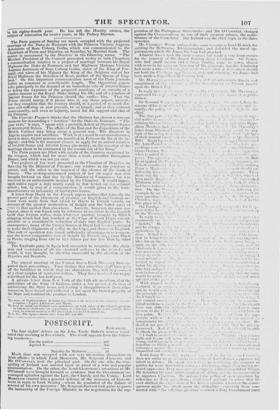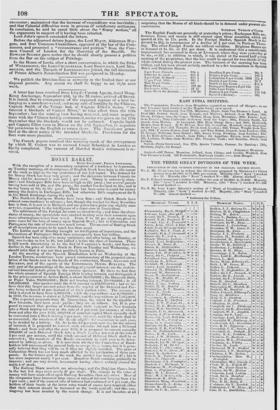POSTSCRIPT.
SATURDAY.
The four nights' debate on Sir John Yarde Roller's motion fermi-. noted this morning at five o'clock. The result appears from the follow- mg numbers—
For the motion 287 Against it 308 Majority for Ministers 2
Much time was occupied with not very interesting discussions on Irish affairs; in which Lord Monerrn, Mr. Sergeant JAul:■.x, and Mr. O'CoNNEia, took the principal part. On the one side, the tran- quillity of Ireland was insisted upon as proof of a vise mid popular administration. On the other, the Lord-Lieutenant's attentions to Mr. O'Connell were brought forward es evidence that the Government en- couraged agitation against the Law, the Church, and the l'nion. Lord Rottman entered into a general defence of the measures of Govern- ment in reply to Lord Stanley—whom he reminded of the failure of several of his own measures : 111r. Sergeant Jackson took pains to prove the insincerity of the Foreign Minister in the negotiation for the sup- pression of the Portuguese Slave-trade: and Mr. O'CONNELL charged against the Conservatives, as one of their greatest crimes, the main- tenance of the Corn-laws. But Ireland was the chief topic iu the three speeches.
Mr. CtrauLEs Woon assigtaal the saute reasons as Lord Howick for quitting the Melbourne Administration ; and defended the naval ap- pointments which Sir .Tames :on hall attacked.
Admiral AnAur. took the saute ceurse ; but made a very lame excuse for the removal of Sir James Gordon front (Altai:nun. Sir James, who had small means and a large faintly, came to town, almost with tears in his eyes, on learaing of his removal ; but the Admiralty
had made a rule—" it WIN then"—that a dog-officer should not hold the Chothala appohnotent., and, unfortnnately, Sir James had been made a flog-ofiler in ,lanuttry last.
Mr. MaeLitaa. eatelnettael t"te •,nee of E'1111,11n41 to,,vards Russia, and complained of Cie I!, 4.; ov,:r,Inl-nt hbutt3 upon the British 11a:1, In reply to st::::e ole,ereat . • :••••:‘:: Mr. •,..''‘-'•.•NN1:1.1., Mr. BRADSUANV expressed. his r•.•go,t :hat h.... 1 1 a -ed. C.a. Qe. en'e mono at a public dinner.
Sir Ronmer r:TY, He stated, first., the
reasons ofhis wont or eon11•1., the Govcrument, and se- condly, the policy ' he be the chief.
The first part , a:a:time:1 ii.tle -.!tta i:eeds
cial notice in -;- tie a rmsons fur refusing his coil:1,1e,,a,_ io that Lard Snide}' and other Oibpo- sition .Menthere had eaevioeale cis c t, He r:,l'amkel Macaulay's
letter front Witals,if Caetle; and a-;',,ed woula be any fruit of his union wi,l; the .if 1-1 1:::':org1.1 "plolgict> of their mutual loves"---dit ft', iin.p,2 0i' it,'.11t Ildi or a Quadrennial
: Bill? Replying' to tic.• the Anti-Poor-1:• v
rrne Ministers to -1 e.,s11,,,,,;e.,'aeitetion Li[:a ion for other par- a. ;%2 Z:5 1.01' the Bat- ' ea•'atueu;-, air ,e1 le making emit •,11,e11,1 not Cli re!.;t: ooluions.
nentiaaeal Seclelist, who hari Rirmi,erlettn I Ile reproached , lenb. of vellieit I alarst administre-
I. .'.trot have followed the fe.--1inahe it an h 1 :11.• T',!::r.p.ts 11: 10 -1,...,1 at Cho s ; it :1.1)-
oa was sp ?Rs put oil:.
tnit111,2 sltlt"ect; 11) ---1.11 111,1,A :11:e,1 lcs iR1et...- ..V0*, \c,15
• •ir
• 1,•,,pean:issl.,:l It re, r•-•
bore be hi- : considered tit:0.11e, . Tim!
ii '„rf
. 11.ci ;
, :sc.. out
- .
%Ito.
ch
.recut their /`.."1,1 011 "1 •.u;11•.u;11 Ili- sep- al .!11 :Jot c.0,:.•••::1 or tog, :he,.Ill that he already ' .1: ...C":1 still be able 1:,:st \ V-1,11 011 ;110 ail,: it■ 011 2i,2
• .•,-, 1 s1
I, 1 virkt.111,11
Lord Jolts RI. -a I i.'s sep'ek , ea -1 in the .••
does lint strike us 1,,e.,1 n:11111;111011 for talent in debate. lie speot io •1, the conduct of parties for more tlion hod' a coon. having re-
ceedings were : blame ( )ostler. It w.e. .when it suited :1, poses. 'rite agitat1::11 lot or against the Cora-lat.es,
Robert considears1 Frost a Magi-,.r.tte I, indirectly have ',Ito there was the "it.' been made Ilegi,t71,.. 'Ministers with ioc.„- lied been reduced , tion. On the , example he set r1,,;!:•
open question—ibo" str chandos, repro-' first place to ti„ • •1, On Foreign . a: • ' peered that lie on the 'Treasury In reply to the • sentiments on th: •■:.- " feelers." lie 1.::1 and he always .h , agriculture by .., ::t.•1 duty. It had be, 1.
lion to bring f cIC, 1.•
ble; l'or on the eve.,10:.- i•„.
open on the 5111, 1:,:: IN/Misters had
was received l.• Millty up to tht• v. tt.it
t-i .\1.• temlal to repe-11 1!“•
below Ilia align i!e a •• who had enders„
loss
would he guilty •,t•-t ,tt,.itt-t it, i, ad/lyric,/ ter th;stit i With T0SpeVI: 10 0,0 1'
declared it as II:- ••
and be would ;al.]. h e. s", the principle of .1:a :"_ :',,•':: e' hill
the t'hurch he re !,, e
any control (Ivor ."1. 1:y N, tional settlemea, 'our: v the ' have any (little!' Ity \V '1 l'r1••1 present to the I !, • that point. N(Ialea. ,'•,l ! ' porters with w' at t e
compromise his , tt desired not pee •• as,
possessed. Aln if le- m • to check the press--u ‘latiste-: I shall be• it- right, and if you , lo 1: wrong, and if yoo impedimm.ts 11111c11 s.■It V.1:1 guarante,s ag,:i:e.4
Miplablied gad :
encounter; maintained that the increase of expenditure was inevitable ; and that Colonial difficulties were in process of satisfactory settlement. In conclusion, he said he cared little about the " flimsy motion," nil the arguments in support of it having been rebutted.
Lord John's speech concluded the debate.
Before the adjourned debate began, the Lord Mayor, Alderman Hey- gate, and four Common-Councilmen, appeared at the bar of the Com- =tons, and presented a "remonstrance and petition" from the Com- mon Council of London for the liberation of the Sheriffs. Sir EDWARD SUDDEN gave notice that he should shortly present a petition from the Bar on the subject of Privilege.
In the House of Lords. after a short conversation, in which the Duke of WELLINGTON, the Loan CHANCELLOR, Lord lloottcatAm, Lord MEL BOURNE, and the Marquis of LONDONDERRY joined, the full discussion of Prince Albert's Naturalization Bill was postponed to Monday.



























 Previous page
Previous page